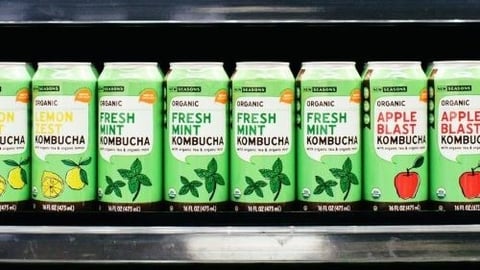The Effects of Cannabis, THC and CBD on the Grocery Sector
While cannabis is in the news with 4/20 Day and more states, including Florida, set to vote on the legalization of marijuana, the culture is shifting in the merchandising of products with tetrahydrocannabinol (THC) and cannabidiol (CBD) and in consumer habits where cannabis is allowed.
Data company Numerator is out with a new study focusing on the impact of cannabis on consumer behavior. The survey of nearly 6,000 present and past-self reported THC and CBD users revealed that some grocery categories are affected by intake of such substances.
[RELATED: CBD Beverages Seeing Mixed Success]
Perhaps not surprisingly, the research shows that THC users spend more of their grocery dollars on snacks and beverages, spending 1.7 times the average on sports and energy drinks. Younger Gen Z consumers are more than twice as likely to snack or eat while using THC, at a rate of 50% compared to 43% of Millennials, 27% of Gen Xers and 17% of Boomers.
In addition, more than a third (36%) of respondents said they have cut their alcohol intake since they began using cannabis products. Still, they are more likely than non-users to buy alcohol, at 73% intent versus 65%.
There are some differences among THC and CBD users. Numerator’s analysis show that THC is more broadly used for recreational, social and creative proposes, while CBD users tend to be older, looking to manage health issues and have higher incomes.
Other studies support the expansion of this market. Earlier this year, research platform Veylinx reported that consumer demand is rising for non-alcoholic cocktails enhanced with CBD, up 4% on a year-over-year basis.
As a testament to the future of these categories, Western Michigan University's acclaimed Food Marketing program within the Haworth College of Business has added cannabis marketing coursework. "We try to stay on trend in our curriculum, and we noticed so many of our WMU Food Marketing students landing jobs in the cannabis industry, primarily THC," explained Dr. Russell J. Zwanka, director of the Food Marketing program and associate professor of food marketing. "Here in Michigan, THC is an almost $3 billion industry, and there are jobs similar to all retailers and CPGs, such as marketing, finance, merchandising, and category management. We see this business as continuing to grow exponentially, as THC has strong appeal to this next generation of adults."
He continued, "One of the hottest trends in the industry right now is infusion in foods and beverages, whether cooking at home and purchasing at a dispensary. The entire cannabis industry, including the cannabinoids that can be sold outside of dispensaries, such as CBD, is collectively growing, as well, although THC tends to be the hottest trend. We want our students to be the best prepared for any role in any aspect of selling CPG items through retailers to consumers, and so it made perfect sense to add a Cannabis Marketing class."
To Zwanka's point, R&D work continues in these categories that are currently budding, no pun intended. The THC-based brand Cann recently announced a partnership with sports and pop culture digital media company Barstool Sports. Kicking off before summer, the beverage maker and Barstool will roll out promotions on various Barstool programs and social media platforms.
“We are big believers in the THC drink category and couldn't be more excited to have Cann as our first partner in this space. Not only are they one of the top brands in the category but they are leading the charge and paving the way. We are thrilled to be on that journey with them," said Ryan McDermott, SVP of sales for Barstool Sports.
Added Jake Bullock, Cann’s CEO and co-founder: "We are honored that Barstool Sports is willing to make a bet on THC drinks and Cann given their highly loyal and diverse audience who will benefit from a new social beverage option. They are the right partner to help us land Cann in everyone's fridge this summer.” Cann products are available at some grocery stores where such products are legally available to purchase, such as select Cub Foods, Stew Leonard’s and Wegmans Food Markets locations."
Regulations for supermarket sales of products infused with hemp THC vary by state, of course, and many manufacturers of such products sell their offerings into local dispensaries. Minnesota is one state that allows sales of certain infused drinks in grocery stores where alcohol is sold. In other areas, products that contain less than a milligram of TCH per serving are not considered cannabis.






